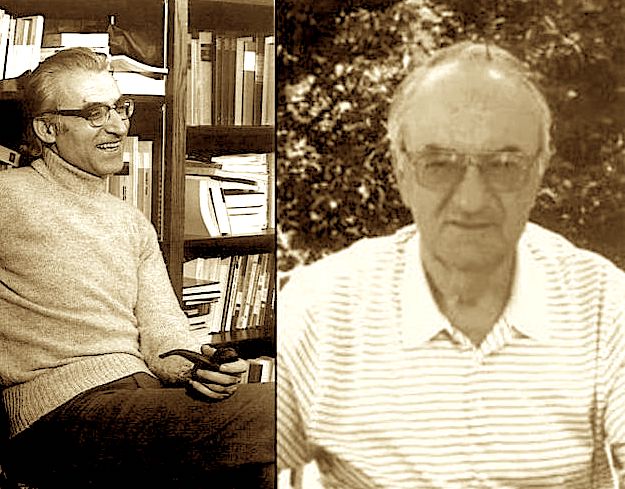When politics was still silent about Kosovo – Albanians in America mobilized the academic world – Academic lectures and discussions preceded the drafting of political arguments and petitions that would be used in the following two decades in lobbying for Kosovo
The events of 1981 left an extraordinary impression on some of the leading intellectual figures of the Albanian community in the United States, not only because the protests of the Albanian people were violently suppressed and did not yield any positive results, especially because of the ease with which which they were ignored by international politics and forgotten by the world’s media. A year later it was as if they never happened.
Kosovo was not known in Washington and in the main European and world capitals. The press was ignorant and inattentive. While the academic world had only rare studies and books, often reflecting Serbian views and pseudo-history.
American Albanians had not yet discovered the modern lobbying in which they would engage starting from the second half of the decade. Under these conditions, a number of Albanians engaged in American universities decided to start the war right there. After long talks, it was decided to organize an international conference on Kosovo, to be serious and academic.
Two figures were placed at the head of the effort as co-leaders of the initiative: Prof. Sami Repishti and Prof. Arshi Pipa. (Right and left, respectively, in the accompanying photo, at the top of the article.)
Among the Albanians who could be approached was Prof. Peter Priest, Prof. Nikola Pano, and others. But the most important thing was to approach non-Albanian professors, especially from Harvard University and other renowned schools.
The initiators were confident that if the cause of Kosovo became known in the academic world, sooner or later, the influence would also extend to the media, strategic institutions, politics, and government.
This initiative could not rely solely on intellectual power and connections in academia. Community engagement with people, materials, and financial assistance was also needed.
Around professors Repishti and Pipa, an Organizing Committee was gathered that would make everything possible. Members of the Commission were: Dr. Jani Dilo, Fejzi Domni (M.D.), Gjeke Gjonlekaj, Agim Karagjozi, Peter R. Prifti and Zef Shllaku. Stephanie Kozmo, a student at Columbia University, served as organizing secretary. Misses Diana Repishti and Fehime Pipa were the main daily volunteer helpers before and during the conference.
Martin Camaj from Germany, Anton Logoreci from London, Dr. Elez Biberaj and Prof. Safete- Yuka from USA etc.
“The number of those who contributed financially was large”, says Prof. years later. Repishti, “with modest but generous amounts. I remember here the late Abdullah Kaloshi who voluntarily undertook the collection of considerable aid”.
The Bitici brothers also provided a great help, says Prof. Repishti, who served refreshments and light meals and later dinner at the well-known “Toscana” restaurant.
The conference was held on November 6, 1982, in the famous “Aeolian Hall”, which at that time was part of the large University Center for doctorates and master’s degrees of the public University of the City of New York (Graduate School and University Center of the City University of New York).
The theme of the conference was “The issue of Kosovo: historical considerations and perspectives for the future”.
The success of the conference was heralded from the list of its sponsors: the Office of International Programs (University of Minnesota), the Albanian Institute of the University of Munich (Germany), the Institute of Albanian Language and Literature of the University of Palermo (Italy), the Department of French and Italishtes (University of Minnesota), the Association of Albanian Studies in the USA, the Pan-Albanian Federation of America VATRA, and the Albanian Center of New York.
For most of the data of this article, I am grateful to Prof. Sami Repishti who has described the conference in writings and memoirs over the following years.
The big hall was filled as rarely ever because of the Albanian-Americans not only from New York, but from all over the USA. The most important was the presence of well-known American, English, German, French, etc. researchers. There was even an Australian professor among them.
Prof. Repishti (Adelphi University) also held the Opening Speech of the Conference with a greeting and thanks to the participants, with a summary of its goals, and with an articulation of patriotic and human hope, that from that hall the road to solving the issue of Kosovo.
Underlining the academic and scientific nature of the conference, he elegantly expressed:
“We have gathered here, not to judge, but to clarify”.
The morning session included lectures on the historical and cultural aspects of Kosovo. It was directed by Prof Albert Lloyd (Harvard University), world-renowned for his studies of epic ballads handed down orally over the centuries, with special attention to the Albanian Epic.
The session of Mbasdita focused on the political, economic, constitutional/legal topics of Kosovo and was led by Prof. Arshi Pipa (University of Minnesota).
In the break between the two sessions, the public had the opportunity to visit an exhibition of Albanian publications in different languages, as well as some books of a historical and literary nature, in the Albanian language.
Below is the list of lectures, saved by Prof. Repisth:
Prof. Safete Juka (Lafayette College, Pennsylvania) relying on recent archaeological discoveries, pointed out the Dardanian-Albanian continuity of Kosovo and focused on Albanian-Slavic relations. She concluded that the Albanians in Yugoslavia were victimized by the Serbs, but they did not respond in kind. They have respected the culture and religion of the Serbs. For this he also used the example that is often mentioned today, the protection of Serbian religious monuments by an Albanian family during the Ottoman occupation.
Prof. Alain Ducellier (Université de Toulouse-Le Mirail, France) spoke on the origin and failure of the medieval Albanian state. He defended the thesis that since ancient times the Illyrian-Albanian tradition and continuity has been preserved in a Balkan area that stretches from Kosovo and Macedonia to the shores of the Adriatic coast. The reason for the non-formation of a powerful Albanian state, according to him, was the Greek-Byzantine, Venetian, Ragusian and Turkish schisms. They instigated the division among the Albanians for their own interests.
Prof. Peter Bartl (Ludwig-Maximilians-Universität München, Germany) focused on Kosovo in the light of church relations, especially on the connections of the Albanian Catholic population with the Archdiocese of Skopje and Tivar.
Prof. Gerhard Grimm (Ludwig-Maximilians-Universität München, Germany) focused on ethnographic maps of Kosovo. Only one map from 1739 shows the Kosovar ethnicity in the framework of the Turkish empire. Most of the later maps have been manipulated for political reasons, and present Kosovo as part of Montenegro or Serbia.
Prof. Nicholas C. Pano (University of Western Illinois) addressed the political thesis “The Kosovo issue in Albanian politics and diplomacy from 1912-1939”. He emphasized the great importance of the Albanian League of Prizren as inspiring and decisive for subsequent events and the political vision of the Albanians, as well as analyzed the role played by Kosovo in the political life of the Albanian state until 1939.
Prof. Jens Reuter (Südost-Institut, Munich, Germany) spoke about the serious problem of neglecting Kosovar girls from the education system in Kosovo. Discrimination by the government in general of Kosovar students and professors has had serious consequences for society in Kosovo. This has aggravated inter-ethnic relations but has strengthened the national feeling of Albanians.
Prof. Martin Camaj (Ludwig-Maximilians-Universität München, Germany) lectured on the topic “Topology of dialects in Kosovo”. He defended the thesis that today’s Georgian in Kosovo tends to simplify the phonetics of Albanian, a process that is being hindered by the “unified language”, while the morphology and syntax are being damaged by the imposition of Serbian and Macedonian. This development risks the disappearance of the Kosovar dialect.
Prof. Albert Lloyd (Harvard University) spoke on the collection of rhapsodic songs collected in Bosnia and Albania. In Novi Pazar, he was acquainted with Albanian rhapsodes who sang Albanian and Serbian songs, and presented his conclusions about the change of forms and formulas of oral epics when they pass from one nation to another.
Prof. Arshi Pipa (University of Minnesota) also spoke about the differences of the epic in the Balkans. His topic was “Albanian singers in Serbo-Croatian: border epic cycle (krajishnik=kreshnik)”. He presented an analysis of various theses on the origin of the Albanian Kreshnik cycle. Prof. Pipa was of the opinion that the cycle containing mythological elements is older and precedes that of Bosnian songs.
List of lectures of the Afternoon Session:
Prof. Adi Schnytzer (University of Griffith, Australia) offered a scientific comparison between the economy of Albania and that of Kosovo, highlighting the different economic systems developed by the regimes on both sides of the border. He concluded that Albania, although independent, is not more economically developed than Kosovo.
Prof. Peter R. Prifti (University of California, San Diego) spoke about the prospects and problems of the Kosovar economy. He researched the economic causes of the 1981 demonstrations in Kosovo. The priest pointed out the discriminatory measures against Yugoslavia that have delayed the economic development of the country and emphasized the great economic damage caused by high illiteracy in Kosovo.
Prof. Paul Shoup (University of Virginia) addressed the political system of Kosovo. An expert on Yugoslav affairs, he did a historical look at the state of Kosovo, and defined the period 1944-1961 as the period of police control. He emphasized that if Kosovo had been declared a “federal republic” in 1946, “the terror of that period would have been avoided”. But, he said that the constitution of 1974 has given the Albanians a high degree of self-government, although it could not satisfy their ambition that now requires a republic with full rights. He was not optimistic about this federal change.
Dr. Sami Repishti (Adelphi University) spoke on the constitutional changes of the Yugoslav Federation. He pointed out the discrimination against the Albanians of Yugoslavia compared to other ethnic groups. He also emphasized the nature of the constitutional status in Kosovo that had form but not substance.
Dr. Elez Biberaj (Columbia University) spoke about the causes of the crisis in Kosovo and the Yugoslav efforts to stabilize the political situation in the country. He enumerated the discriminatory measures that have angered the Albanian population. The demonstrations of 1981 are an outgrowth of this anger, he declared.
Researcher Anton Logoreci (BBC-London, UK) described the difficult path of Albanians in Yugoslavia from 1912 to 1982. The accumulated suffering and abuse that angered the Albanian population and reiterated that the demonstrations of 1981 are the result of continuous repression Serbs of Yugoslavia.
Prof. Robert Sharlet (Union College and Columbia University) recognized that the ethnic disputes in Yugoslavia cannot be hidden by economic and cultural moulds. “The Kosovo crisis is the last and perhaps the most serious manifestation of the ethnic division in Yugoslavia after the Second World War. This leads Yugoslavia towards a general crisis of its system”. Prophetic words when you remember what happened in the years that followed.
Prof. Francis Dessart (Director, Center for European Studies, Brussels, Belgium) emphasized that the isolation of an ethnic group creates dependency, a situation that ends in victimization and a cultural and political imperialism towards the group. The Kosovo problem is a call to the consciousness of international solidarity for the protection and victory of human rights.
Dr. Patrick F. R. Artesien (University of Bradford, UK) spoke on the Kosovo problem and the future of Yugoslav-Albanian relations in the Balkan perspective. He said that the Kosovo crisis damages these relations and may cause other complications in the Balkans.
Researcher Branka Magash (University of Bradford, UK) presented the Yugoslav view of the Kosovo problem. She stated that the treatment of Kosovars from Tito’s Yugoslavia is aimed at their complete integration. In time, she said, Kosovo can become a republic, but repression against Kosovars cannot be justified.
Prof. Mihajlo Mihajlov (University of Virginia) addressed the topic of what will be done with Kosovo if Yugoslavia is democratized. He showed the contacts with former Albanian political prisoners in Belgrade prison (where he had spent seven years) and emphasized the discrimination against Albanians by the prison authorities. He was pessimistic about solving the Kosovo problem as long as Yugoslavia remains undemocratic. In case of democratization, he said, Kosovars will seek union with Albania.
The conference was closed by the other coordinator of this historic organization, Prof. Arshi Pipa. This staunch anti-communist, in front of a hall dominated by professors and students from academies where leftism has often prevailed, offered them an almost genius expression: “The Kosovars are the proletarians of Yugoslavia.”
“The purpose of the conference was to analyze the situation in Kosovo in an academic and scientific way and without prejudice, because only in this way is the understanding between the interested peoples and peace in the world served”.
The Serbo-Croatian emigration press and the Albanian newspaper “Dielli” highly praised the activity. The lectures of that conference continued to be used in the following years, even in 1994, the Publishing House of the University of Columbia (Columbia University Press) published them in a volume “Studies of Kosovo”, with editors Arshi Pipa and Sami Repishti.
The Yugoslav press of the time denounced and attacked this important academic event with hatred. And the communist press in Albania, although it claimed to defend the cause of Kosovo, remained silent and completely ignored this conference. But time legitimized its importance. The academic lectures and discussions presented there preceded the drafting and articulation of arguments and political petitions that would be used in the following two decades by Albanians in lobbying for Kosovo.
Today, 40 years later, when the efforts for similar seminars end in limited Albanian activities, with empty halls, or with more speakers than listeners, I say that we have a lot to learn from the example of Prof. Sami Repishti and Arshi Pipa who day to gather not only their academic colleagues but also to mobilize the community, from the example of hundreds of Albanians who answered the call for help with what little they had, and with the example of this conference that preceded the great events of the era, undoubtedly influencing them./Illyria









Your article helped me a lot, is there any more related content? Thanks!
Thank you for your sharing. I am worried that I lack creative ideas. It is your article that makes me full of hope. Thank you. But, I have a question, can you help me?